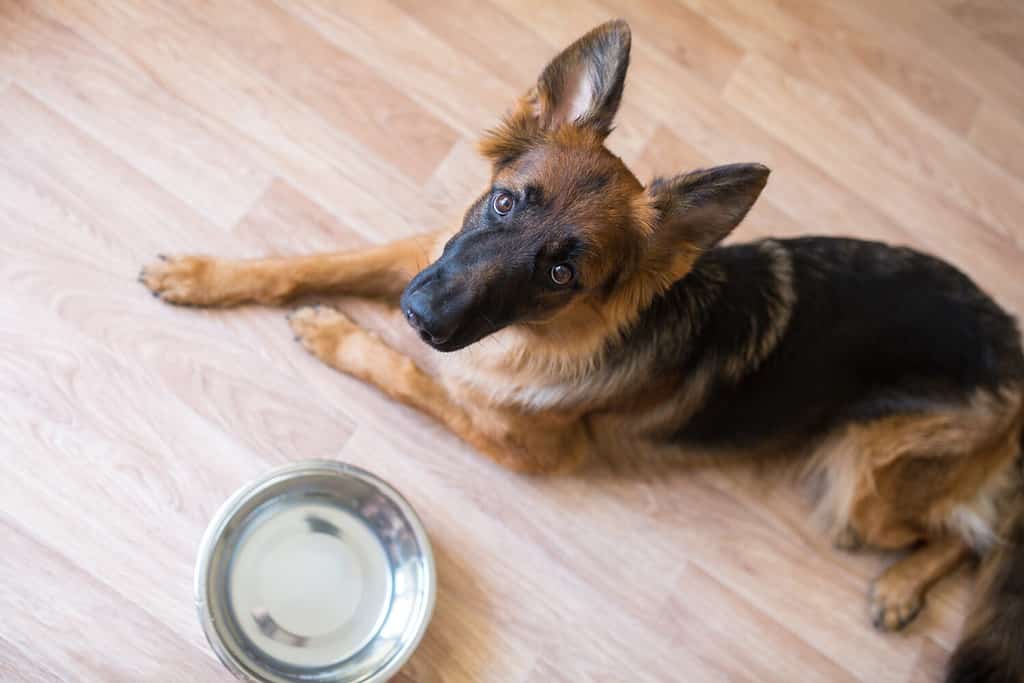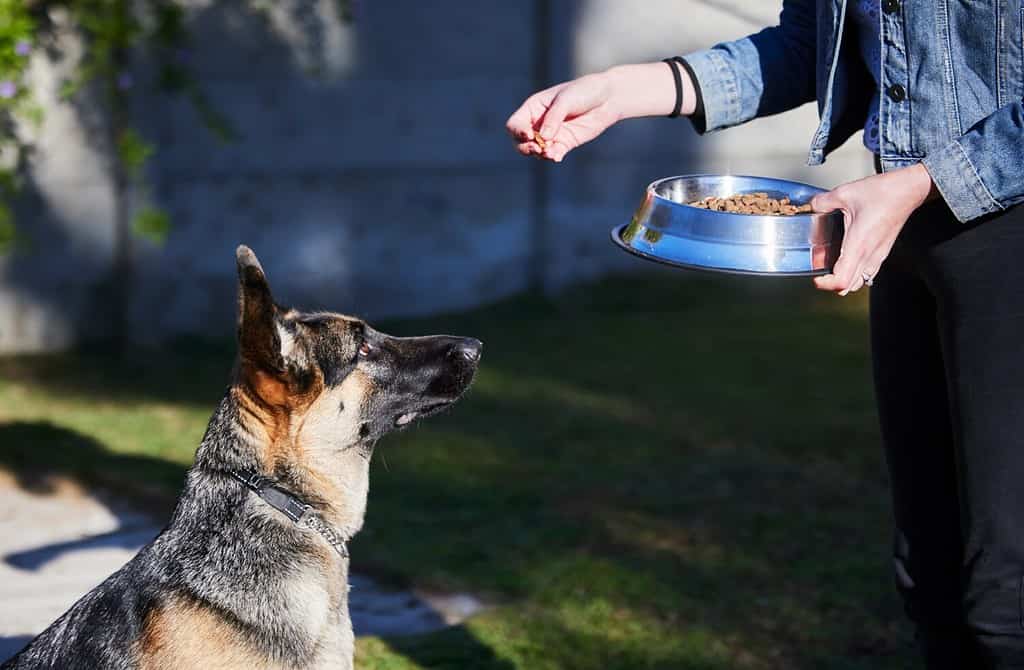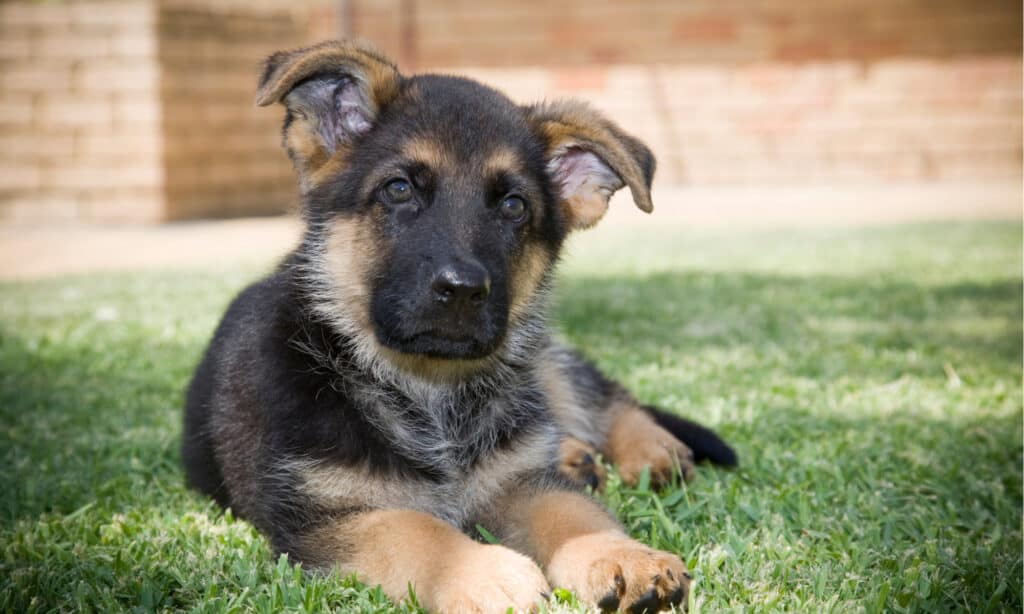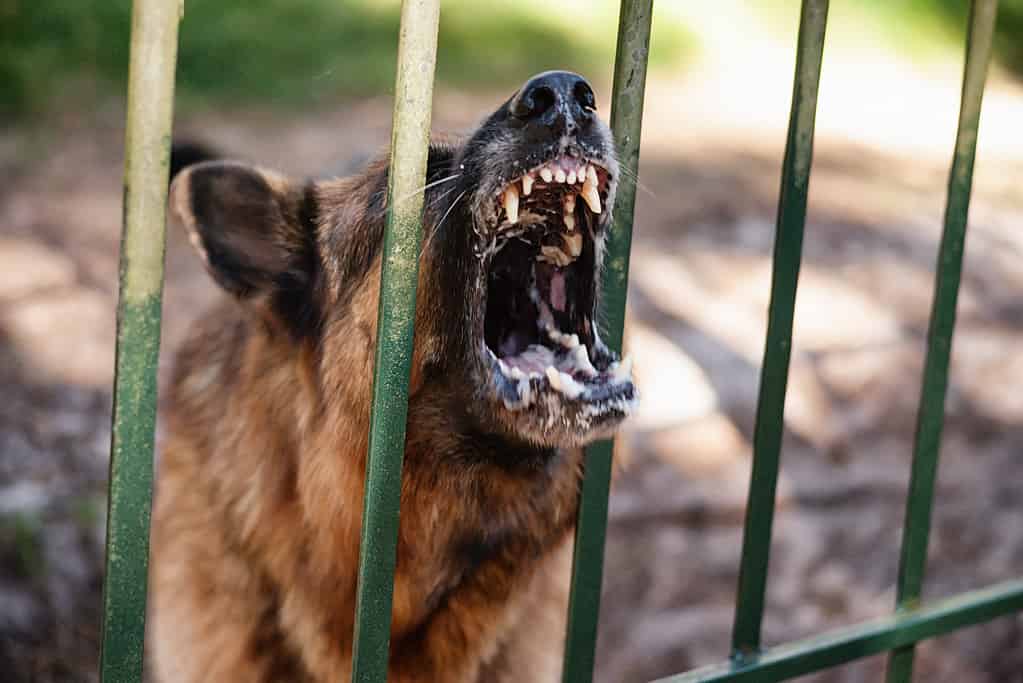Are you thinking of adopting a German shepherd or want training tips for your current pup? This German shepherd training guide is here to help!
German shepherd training should begin as soon as you bring a new puppy home and continue throughout their lifetime. These smart dogs tend to catch on quickly to new concepts, but you may run into challenges such as resource guarding.
In this guide, we’ll discuss training tips, recommended cues, and more.
Are German Shepherds Easy to Train?

German shepherds are handler-focused and learn quickly.
©Korneeva Kristina/Shutterstock.com
German shepherds are easy to train because they’re smart and eager to please. They’re one of the smartest dog breeds in the world, which means they learn quickly with little repetition. However, their intelligence can also get them into trouble!
There are also some other common issues with German shepherds. Some dogs guard inappropriately, especially if not trained and socialized from a young age. Some lines of backyard-bred German shepherds seem to have anxiety which can lead to behavioral problems like reactivity.
Training for a German shepherd puppy should begin with their breeder n before you bring them home. They will learn quickly but may regress during adolescence. Training is a lifelong commitment, but most dogs settle into good behavior in the first one to two years.
What is the Best Method to Train a German Shepherd?

Positive reinforcement is one of the best ways to train your German shepherd.
©PeopleImages.com – Yuri A/Shutterstock.com
Force-free dog training is science-based and humane. It’s the best way to train a German shepherd or any other breed.
Some people, especially unethical trainers, will claim that large breeds like German shepherds need a “firm hand” or an “alpha” to dominate and control them.
However, it’s been proven that dogs don’t work this way and that harsh training methods promote fear and aggression. Aversive training methods and tools often lead to fallout in poor behaviors and can make behavioral problems worse in the long term.
When researching training techniques or choosing a trainer, look for labels such as force-free and positive reinforcement. Compulsion trainers and most balanced trainers should be avoided at all costs.
How do you Discipline a German Shepherd?
The following are some ways to discipline your German shepherd and teach them the right ways to behave.
- Positive reinforcement teaches your dog what you do want and is vital to emphasize, in addition to teaching them what you don’t want to see.
- Redirection tells your dog to stop and do something else, such as biting a toy instead of your hand.
- Management prevents your dog from misbehaving in the first place and includes puppy proofing, keeping your dog on a leash, using pet gates, etc.
- Ignoring bad behavior is sometimes the best thing you can do, such as getting up and walking away when your puppy bites to show them that playtime ends when they get too rough.
- Changing your behavior goes a long way toward getting your dog to behave properly as well. For instance, a puppy peeing indoors needs to be taken outside more frequently.
Never hurt your dog as punishment. This includes painful tools such as shock and prong collars.
Socializing Your German Shepherd

Socialization is key for young German shepherd puppies.
©Tap10/Shutterstock.com
Socialization begins with the breeder and should continue when you bring your German shepherd puppy home. You want to introduce your pup to all of the things they’ll experience as adults so that they learn to be confident and fear-free in new situations.
This only works if their experiences are positive, so make sure to go at your puppy’s pace and avoid overwhelming them with new things.
It’s also important to remember that your puppy doesn’t need to interact with things to benefit from being around them. For instance, learning to walk past other dogs on a leash is better than going up to every dog you see. (Though playtime with well-behaved, healthy dogs is also important!)
Don’t forget to introduce loud sounds, such as fireworks with a recording at a low volume, or to introduce handling. You’ll want to replicate things your dog will experience during grooming or at the vet to make these situations easier for everyone when the time comes!
German Shepherd Cues to Teach First
The best cues to teach your German shepherd puppy include:
- Basic cues like sit, down, and stay
- Leave it and drop it
- Recall (returning to you when called)
- Leash manners
- Waiting at the door rather than dashing outside
- Speak and quiet (to prevent excessive barking–speak should be taught first!)
You don’t want to focus on all of these at once or on achieving perfection while your puppy is young. You can work on a few important cues throughout the day and choose new ones as they get the hang of what they’ve learned.
Another important thing to focus on while your puppy is young is socialization, which means introducing them to a variety of new sights and sounds, places, people, and other dogs.
Your shepherd puppy doesn’t need to be friends with everyone they see. Learning how to behave on a leash around others is just as necessary as actually interacting with them!
If you’re struggling with training your German shepherd, puppy training classes can be invaluable. They teach you the basics and also help with socialization.
Other Helpful Cues for German Shepherds to Know
German shepherds love training and before long, you might find yourself running out of ideas! Daily training provides great mental stimulation for these brilliant dogs.
Some people like to focus on useful cues such as retrieving items, putting away toys, or even service dog training. Others like fun cues like teaching their pup to pose for selfies or to high-five.
Once your dog knows the basics, there are few limits to what you can achieve together and many paths you can take.
You can also train for dog sports such as agility. Just be cautious if your dog isn’t yet fully grown, as too much stress on their joints can cause health issues such as hip dysplasia.
Common German Shepherd Training Mistakes

German shepherds are prone to excessive barking if not trained and cared for properly.
©bbstudio_aad/iStock via Getty Images
The most common training mistakes can usually be categorized in two ways: using poor training methods and not taking steps to prevent misbehavior before it happens.
Poor Training Methods
- Using aversive training tools or methods. This type of training harms your relationship with your dog and can lead to behavioral problems. It’s also less humane than force-free alternatives.
- Encouraging aggression, guarding, or biting. German shepherds have an instinct to guard and don’t need to be taught. Especially without experience, this kind of training can backfire heavily and lead to a dangerous dog.
- Putting your hand in the food bowl or taking things away to prevent resource guarding. These behaviors make dogs feel insecure and often lead to resource guarding. Instead, trade your dog often for higher-value items, and let them eat their meals without disturbances.
- Not hiring a professional when training becomes too difficult. There’s no shame in asking for help when you need it! Getting a professional involved early on can prevent behavioral issues from becoming worse.
Not Preventing Poor Behaviors
- Not teaching a “quiet” cue to stop barking. German shepherds can be very vocal, so this is a good thing to teach early on.
- Setting your dog up to fail. Whenever possible, your dog should be set up to succeed! This includes dog-proofing your home, ensuring they can’t run out the door, and keeping food picked up so they don’t get into it.
- Only saying “no” without any yeses. Each time you say no to something, your German shepherd should also be told what to do instead. No begging? Lay down in your bed. No biting hands? Go get a toy!
Without these alternatives, your dog can get confused and not know what to do. - Introducing dogs fast and not learning dog body language. This can become disastrous if the dogs don’t get along, and it’s vital to introduce them properly.
The photo featured at the top of this post is © PeopleImages.com - Yuri A/Shutterstock.com
Ready to discover the top 10 cutest dog breeds in the entire world?
How about the fastest dogs, the largest dogs and those that are -- quite frankly -- just the kindest dogs on the planet? Each day, AZ Animals sends out lists just like this to our thousands of email subscribers. And the best part? It's FREE. Join today by entering your email below.
Thank you for reading! Have some feedback for us? Contact the AZ Animals editorial team.







